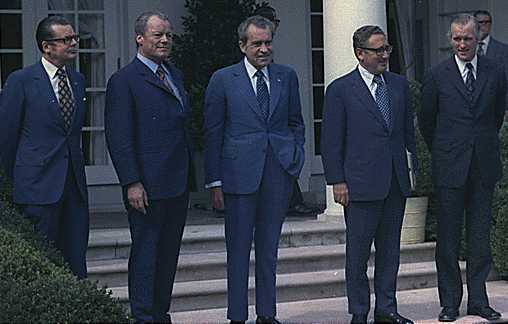Nixon and Detente
 Berndt von Staden, Willy Brandt, President Nixon, Henry Kissinger, Gunther van Vell during the visit to the U.S. of Chancellor Brandt of the Federal Republic of Germany 9/29/1973
(NLNP-WHPO-MPF-E1558C(10) ) from NA |
Henry Kissinger
|
|
- Henry Kissinger replaced Walt Rostow as National Security Advisor - 1
- William Rogers replaced Dean Rusk as Secretary of State - 1
- Melvin Laird replaced Clark Clifford as Secretary of Defense
- Kissinger and Nixon were pragmatic, flexible, sought order and stability, balance of power, and direct, controlling foreign policy from the White House and NSC rather than relying on bureaucracy
- influence of NSC increased - produced options and info for Nixon - 1
- elitist staff - Alexander Haig, Roger Morris, Mort Halperin, Helmut Sonnenfeldt, Larry Eagleburger
- interagency committees - Defense Program Review Committee; the 40 Committee for secret covert operations such as destbilization of Chile; WSAG Washington Special Actions Group, Intelligence Committee
Detente
|
|
- arms limitation, relative security, linkage of issues, building block approach
- Kissinger believed "peace was not a universal realization of one nation's desires, but a general acceptance of a concept of international order."
- Soviets had built stockpile of 1200 ICBMs, especially the SS-9
- Nixon under pressure from JCS to expand U.S. arsenal of 1054 ICBMs, Polaris subs with 656 missiles, 450 B-52 bombers - sought to deploy new MIRV warheads - Multiple Independently-targeted Reentry Vehicle - and ABMs - Anti-Ballistic Missile defense - 1
- Kissinger worked closely with Dobrynin from Helsinki meeting Nov. 17, 1969 to Moscow summit May 22-29, 1972
- agreement in Nov. 1971 to sell $136m wheat, and $125 oil drilling equipment to Russia
- Nixon arrived in China Feb. 21 - Shanghai Communique
- SALT I Treaty signed with Brezhnev in Moscow May 29, 1972 - ICBM numbers frozen for 5 years, giving Russia more missiles but U.S. allowed to deploy MIRV warheads; both allowed to deploy 2 ABM sites but no more; Basic Principles accepted concept of equality of strategic aresenals
from Time 12/28/70 - Brezhnev agreed to help Nixon push North Vietnam to negotiate end to war, and Nixon began trade with Russia, sale of wheat, Siberian gas investment - but Sen. Henry Jackson led passage of Jackson-Vanik amendment to withhold most favored nation status until Russia allowed unlimited Jewish emigration and guaranteed human rights
- Cienfuegos issue handled with quiet diplomacy rather than grow into a public crisis that might destroy detente
- 8/26/70 - U2 photos of new sub base in south Cuba; Russian fleet arrived Sep. 9
- 9/16/70 - U.S. issued public warning - no missle subs in Cuba
- 10/10/70 - subs left Cuba when U.S. said it considered event a "training exercise"
- 11/7/70 - sub tender returned, U.S. protested, tender left 1/3/71
- 2/14/71 - Russian fleet returned, U.S. protest, fleet left 3/1/71
- 5/10/71 - Russian tender and sub returned, U.S. protest, again ships left
- 8/26/70 - U2 photos of new sub base in south Cuba; Russian fleet arrived Sep. 9
- Willy Brandt sought German detent with Russia - "Ostpolitik" - led negotiations that resulted in Helsinki Treaty 1975 - existing boundaries of Europe confirmed, especially West Berlin belonged to West Germany - both Germanys admitted to UN - Eastern Europe agree to "basket 3" human rights agreement
- CNN The Cold War episode 16 and episode 17
- For CNN, the 'Cold War' Is Just Beginning from New York Times, December 27, 1997
- 'Cold War' on CNN: Three Appraisals from New York Times, January 9, 1999
Geopolitics
|
|
- detente with Russia and China, but local communist governments were challenged, else they upset the balance of power
- Chile destabilized 1971-72 to overthrow Salvadore Allende, the 1st Marxist freely-elected in South America in 1970 - economy lost trade, general strike, inflation - Allende died in Sep. 11, 1973 coup
- U.S. supported Turkey's invasion of Cyprus July 20, 1974 - Kissinger favored overthrow of Makarios July 5 by rightist officers - Kissinger ignored State Dept. advice to cut off military aid to Turkey because of the illegal invasion
- U.S. suppported Pakistan and its genocidal war against the independence of Bangladesh in 1971 because Pakistan was a friend of China, and Gen Khan had allowed U-2 bases in Pakistan, and India had signed a treaty of friendship with the USSR. Foreign aid to India was halted due to India's support of Bangladesh, the U.S. fleet sailed into the Bay of Bengal. But India never attacked West Pakistan.
- Nixon ended arms embargo to South Africa - 1971 Byrd Amendment allowed U.S. to buy chromium from Ian Smith's white minority government in Rhodesia despite UN boycott - South Africa supported UNITA party in Angola because SWAPO (SW Africa People's Organization) used Angola as base for operations to win the independence of Namibia
- U.S. supported Portugal's rule over Angola until independence granted in Nov., 1975 - Russia supported MPLA (Popular Movement for the Liberation of Angola) and U.S. waged covert war with arms and mercenaries (such as Costas Georgiou, also known as "Callan") against the MPLA in 1975 - Cuba sent 13,000 troops to support rebel Neto in Nov. but Congress refused aid to Angola - MPLA won civil war in 1976 and Pres. Neto recognized by Organization of African Unity